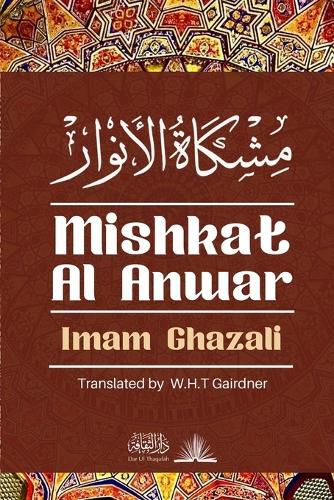Readings Newsletter
Become a Readings Member to make your shopping experience even easier.
Sign in or sign up for free!
You’re not far away from qualifying for FREE standard shipping within Australia
You’ve qualified for FREE standard shipping within Australia
The cart is loading…






This title is printed to order. This book may have been self-published. If so, we cannot guarantee the quality of the content. In the main most books will have gone through the editing process however some may not. We therefore suggest that you be aware of this before ordering this book. If in doubt check either the author or publisher’s details as we are unable to accept any returns unless they are faulty. Please contact us if you have any questions.
The Mishkat Al-Anwar, literally translated "The Niche for Lights," is a theological and philosophical sufi text by the well-known Muhammad Al-Ghazzali. Though the exact date of its writing is unknown, it was authored after his opus Ihya' ulum al-din, or Revival of Religious Sciences. The work focuses on expanding upon the meaning behind a verse in the Qu'ran-the Light Verse (S. 24, 35)-and upon the Veils Tradition in Islam.
The book is divided into three sections; in the first Al-Ghazali deconstructs the word "light" and all its meanings, in the second he discusses the symbolic language in the Qu'ran and Muslim traditions, and in the third he applies his findings to the verse and tradition itself.
Abu hamed Muhammad ibn Muhammad Al Ghazali (1058-1111) was a Persian Islamic philosopher, theologian, psychologist, and mystic, known today as one of the most famous Sunni scholars in history, sometimes cited as next-in-importance only to Muhammad. Born in Tus, Al-Ghazzali was a pioneer of methodic doubt; his work The Incoherence of Philosophers shifted early Islamic philosophy from metaphysics to the theory of occasionalism, an Islamic doctrine that states cause-and-effect is controlled by God. He also succeeded in bringing orthodox Islam in contact with Sufism. The author of more than 70 books on various subjects, his influence continues to stretch far and wide even today.
$9.00 standard shipping within Australia
FREE standard shipping within Australia for orders over $100.00
Express & International shipping calculated at checkout
This title is printed to order. This book may have been self-published. If so, we cannot guarantee the quality of the content. In the main most books will have gone through the editing process however some may not. We therefore suggest that you be aware of this before ordering this book. If in doubt check either the author or publisher’s details as we are unable to accept any returns unless they are faulty. Please contact us if you have any questions.
The Mishkat Al-Anwar, literally translated "The Niche for Lights," is a theological and philosophical sufi text by the well-known Muhammad Al-Ghazzali. Though the exact date of its writing is unknown, it was authored after his opus Ihya' ulum al-din, or Revival of Religious Sciences. The work focuses on expanding upon the meaning behind a verse in the Qu'ran-the Light Verse (S. 24, 35)-and upon the Veils Tradition in Islam.
The book is divided into three sections; in the first Al-Ghazali deconstructs the word "light" and all its meanings, in the second he discusses the symbolic language in the Qu'ran and Muslim traditions, and in the third he applies his findings to the verse and tradition itself.
Abu hamed Muhammad ibn Muhammad Al Ghazali (1058-1111) was a Persian Islamic philosopher, theologian, psychologist, and mystic, known today as one of the most famous Sunni scholars in history, sometimes cited as next-in-importance only to Muhammad. Born in Tus, Al-Ghazzali was a pioneer of methodic doubt; his work The Incoherence of Philosophers shifted early Islamic philosophy from metaphysics to the theory of occasionalism, an Islamic doctrine that states cause-and-effect is controlled by God. He also succeeded in bringing orthodox Islam in contact with Sufism. The author of more than 70 books on various subjects, his influence continues to stretch far and wide even today.